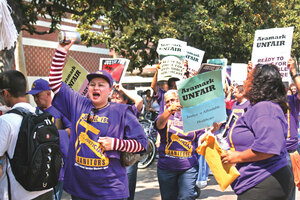Maintenance staff marches in protest
Employees of Aramark Services, a USC subcontractor that provides custodial and janitorial employees on campus, demonstrated in front of Tommy Trojan Wednesday afternoon, ahead of a Friday deadline on contract negotiations.
Approximately 100 demonstrators, including students, faculty and other staff, joined together, insisting on affordable health care and a better contract for the employees.

Negotiations · Members of USC’s maintenance staff, along with faculty and student supporters, march down Trousdale Parkway Wednesday. As they marched, the demonstrators held signs and chanted their demands for better contract terms from their employer, Aramark. - Dieuwertje Kast | Daily Trojan
The demonstrators marched down Trousdale Parkway wearing shirts that said “Justice for Janitors,” holding signs and chanting slogans to protest against what they see as unfair health care terms on Aramark’s proposed contract package.
They gathered in front of Tommy Trojan where Raphael Lieb, an internal organizer for the union, led the crowd in a number of chants and songs.
The demonstration was held in advance of a final round of negotiations between the Service Employees International Union-United Service Workers West — the union that represents the employees — and representatives from Aramark. The union has two days to complete negotiations with Aramark before it must present the contract offer to its members, as per the bargaining schedule agreed to by Aramark, according to Lieb.
David James, a professor at the USC School of Cinematic Arts, has followed and participated in the workers’ efforts for the past 12 years. He addressed the crowd gathered at Tommy Trojan.
“We all know the university treats students very well,” James said. “But there are other parts of our community the university hasn’t treated well, especially those who clean our bathrooms, classrooms and offices.”
James also spoke to the crowd about a successful janitors strike that took place at USC in 1997, when the workers were attempting to join the union.
After the march, the demonstrating employees took buses downtown to the SEIU-USWW headquarters, where negotiations were underway to resolve the situation.
Negotiations between Aramark and the union must conclude within two days. At that point, a contract will be presented to the members of the union. If it is voted down, the employees will have no contract and, according to Jose Jovel, a union member who chairs the negotiating committee, the employees will have to strike.
“We want to win health insurance benefits, good salaries for our fellow workers and families … We are asking to be treated fairly by Aramark management,” said Gloria Canada, one of the demonstrators. “If they say no we are going to strike.”
Many of the demonstrators said they had been working at the university for decades, and had enjoyed their time at USC, but were dismayed by the present situation.
Jovel, who has worked at USC for 33 years, said it was the good benefits available that initially brought him to the university.
“I was working for my family in hopes that if my kids came [to USC] they would benefit from me working here,” Jovel said. “[But now] we are fighting for health care we can pay for, and not have to choose between having health insurance and bringing food to the dinner table.”
Jovel added that he wants the two sides to find a resolution by Friday, ending in good terms.
“That is my hope. I don’t want this to end in a strike,” he said.
The previous contract ended in June and the parties have since been through eight rounds of negotiation, said Salvador Hernandez, an employee who also sits on the negotiating committee. The main point of contention for the employees is a change Aramark made to the health care clauses.
Aramark had initially increased the amount workers would be paying for their health insurance’s monthly copay from 7.25 percent in the previous contract to 25 percent, according to Hernandez. Subsequent negotiation brought the offer down to 12 percent, but many workers are still unhappy with the number.
“They want to increase our health insurance payment dramatically and we can’t pay that,” said Jose Ramirez, a night-shift worker who works on the floor crew. “We want to maintain it to what it is now, which is already high. We are not trying to make money and get rich, we want what’s fair.”
Many of the workers who participated in the demonstration said the health care changes will have an impact on their families.
“I’ve been working on the campus for 19 years and, like you can see, we love USC — this is part of my life,” Hernandez said. “We work everyday to clean and improve this campus, but at this time we are trying to get a full package. We know the general situation and in the country is bad, but our industry is very important, and we’re trying to get a fair [contract] package.”
Although USC is not directly involved with the negotiations, a number of the demonstrators said they believe the university could influence Aramark’s decisions.
“These are all workers here at USC, and USC does support the subcontracting policy,” said Elias Kohn, a student who joined the demonstration. “So even though it’s not USC directly who’s harming these workers, they’re taking part in the harm.”
Bert Riddick, who works on USC’s Information Technology Services staff, said the solution seemed simple to him.
“If the university stepped in and demanded that Aramark offer insurance, that would solve the problem very quickly,” he said.
James Grant, executive director for media relations at USC, wrote in an email that the university has not been involved with negotiations between Aramark and the union.
“The collective bargaining agreement being negotiated is between Aramark and the Union,” Grant wrote. “We appreciate that there may be differing views of the related issues, and look forward to a fair and balanced resolution.”
Aramark declined to comment for the story.
Nathan Gonzalez contributed to this report.
